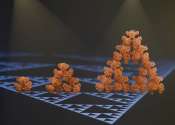Researchers discover bacteria capable of killing fungus that causes yield-reducing disease in sugarcane
A study conducted at the Brazilian Center for Research in Energy and Materials (CNPEM) has discovered that three strains of Pseudomonas bacteria can inhibit growth, and even cause the death, of the fungus responsible for ...









